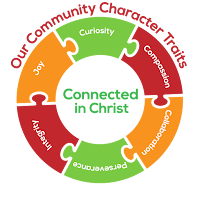As we learn some of our community character traits this year, connected in Christ, there are times when we will notice that there is an intersection of a few of them resulting in new discoveries.
Last week I wrote about compassion, how vital it is, but how difficult it can be as well. In light of how our contemporary society works, compassion for those with whom we have a problem or issue is counter-cultural. Our culture tells us that when we disagree or have an issue with someone, the proper way to go about it is to either a) put up a public and vocal protest about it (social media makes this even easier than ever before), or b) to 'suck it up' and move on.
Honesty and Integrity, as well as collaboration, are other traits we are looking to deliberately focus on and develop in our students and in our community. A few times a year, I hear the phrase: "We didn't want to be the complainers....." or "I would have told you about this sooner, but I didn't want to bother you...." I know the principals hear this as well.
If we have an issue with someone, one of the easiest things we can do is discuss it with close friends. While this can be healthy, we need to watch closely that our discussions remain guarded to protect everyone. If there is something bothering you, as soon as possible, take it up with those involved. Problems are dealt with appropriately, quickly, and the right information can come to light.
Proper handling of conflict or issues is an act of compassion, an act of collaboration, and an act of integrity. While it may seem odd to suggest that complaining or stating that something isn't right is compassionate, the alternative is far worse. If we allow conflict or issues to fester or spread without being dealt with, they can become toxic, fodder for gossip, and destructive to anyone involved as well as to our community.
Attached to today's newsletter is NACE's dispute reconciliation policy. This policy applies and involves everyone in our community - employees, parents, supporters, and board members. Please review it so that you know how to issues should they arise, but also so that you can encourage others to deal with them appropriately. 'Have you talked to _____________ about this?' should be a quick reminder to one another to resolve problems. Matthew 18 provides sound advice from scripture not only to settle disputes but also to proactively protect the Christian community from itself as we know we all fall short at times. Speaking the truth in love is a habit that goes a long way to developing character and a growing healthy community of learning that is connected in Christ.
Last week I wrote about compassion, how vital it is, but how difficult it can be as well. In light of how our contemporary society works, compassion for those with whom we have a problem or issue is counter-cultural. Our culture tells us that when we disagree or have an issue with someone, the proper way to go about it is to either a) put up a public and vocal protest about it (social media makes this even easier than ever before), or b) to 'suck it up' and move on.
Honesty and Integrity, as well as collaboration, are other traits we are looking to deliberately focus on and develop in our students and in our community. A few times a year, I hear the phrase: "We didn't want to be the complainers....." or "I would have told you about this sooner, but I didn't want to bother you...." I know the principals hear this as well.
If we have an issue with someone, one of the easiest things we can do is discuss it with close friends. While this can be healthy, we need to watch closely that our discussions remain guarded to protect everyone. If there is something bothering you, as soon as possible, take it up with those involved. Problems are dealt with appropriately, quickly, and the right information can come to light.
Proper handling of conflict or issues is an act of compassion, an act of collaboration, and an act of integrity. While it may seem odd to suggest that complaining or stating that something isn't right is compassionate, the alternative is far worse. If we allow conflict or issues to fester or spread without being dealt with, they can become toxic, fodder for gossip, and destructive to anyone involved as well as to our community.
Attached to today's newsletter is NACE's dispute reconciliation policy. This policy applies and involves everyone in our community - employees, parents, supporters, and board members. Please review it so that you know how to issues should they arise, but also so that you can encourage others to deal with them appropriately. 'Have you talked to _____________ about this?' should be a quick reminder to one another to resolve problems. Matthew 18 provides sound advice from scripture not only to settle disputes but also to proactively protect the Christian community from itself as we know we all fall short at times. Speaking the truth in love is a habit that goes a long way to developing character and a growing healthy community of learning that is connected in Christ.
